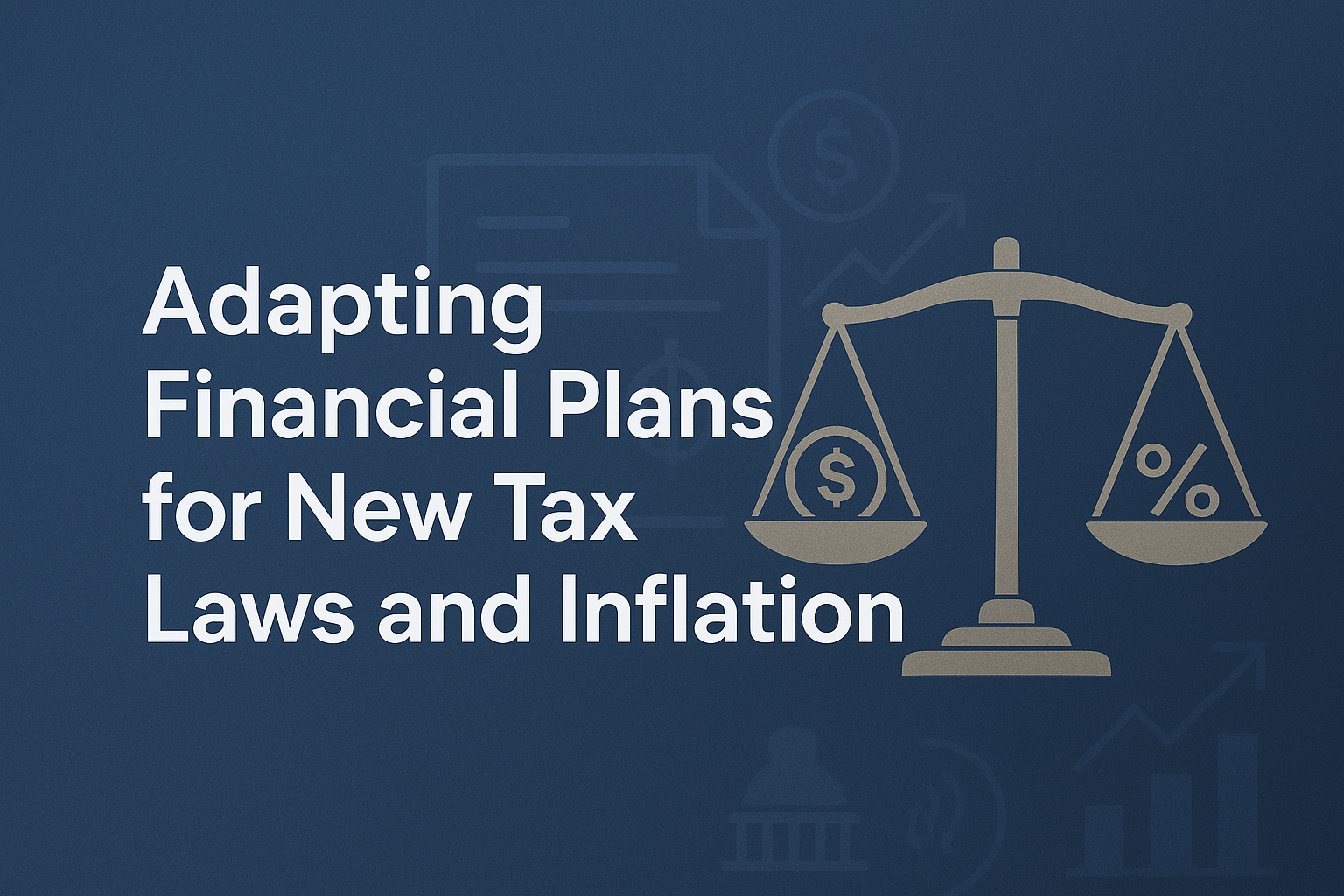In recent years, financial planning has become increasingly complex due to evolving tax policies and persistent inflation concerns. With the enactment of the "One Big Beautiful Bill Act" (OBBBA) in July 2025, significant tax reforms have been introduced, impacting various aspects of personal finance. Concurrently, inflation continues to affect purchasing power, necessitating strategic adjustments to financial plans.
This article explores how recent tax policy changes and ongoing inflation concerns can influence your financial planning and offers strategies to adapt effectively.
Understanding Recent Tax Policy Changes
The OBBBA has brought about several key tax reforms that individuals and families should be aware of:
1. Permanent Extension of Reduced Income Tax Rates
The income tax rates established by the Tax Cuts and Jobs Act (TCJA) are now permanent, providing long-term clarity for tax planning. These rates are as follows:
• 10% for income up to $11,925 ($23,850 for married couples filing jointly)
• 12% for income over $11,925 ($23,850 for married couples filing jointly)
• 22% for income over $48,475 ($96,950 for married couples filing jointly)
• 24% for income over $103,350 ($206,700 for married couples filing jointly)
• 32% for income over $197,300 ($394,600 for married couples filing jointly)
• 35% for income over $250,525 ($501,050 for married couples filing jointly)
• 37% for income over $626,350 ($751,600 for married couples filing jointly)
These adjustments can affect your tax bracket and overall tax liability, influencing decisions related to income timing, deductions, and credits.
2. Increased Standard Deduction and Retiree Tax Benefits
The standard deduction has been increased to $15,750 for single filers and $31,500 for married couples filing jointly. Additionally, individuals aged 65 and older receive a $6,000 standard deduction bonus, subject to phaseouts at higher income levels. These changes can reduce taxable income, potentially lowering tax bills and affecting retirement planning strategies.
3. Enhanced Child and Family Tax Benefits
The child tax credit has been increased to $2,200 per qualifying child, and new credits for adoption and child care have been introduced. These enhancements can provide significant tax relief for families, impacting budgeting and savings plans.
4. Modifications to Charitable Giving and Health Savings Accounts (HSAs)
Starting in 2026, non-itemizers can now deduct up to $2,000 in charitable contributions for couples filing jointly, and HSAs have been expanded to cover direct primary care fees. These changes offer new avenues for tax-efficient giving and healthcare spending, which can be integrated into comprehensive financial plans.
Navigating Inflation Concerns in Financial Planning
Inflation remains a significant concern, with many Americans reporting that their income is not keeping pace with rising costs. This persistent inflation can erode purchasing power and affect long-term financial goals. Strategies to mitigate these effects include:
1. Diversifying Investment Portfolios
Investing across various asset classes, such as equities, real estate, and commodities, can help protect against inflation. While all investing involves risk, equities, in particular, have historically outpaced inflation over the long term.
2. Incorporating Inflation-Protected Securities
Treasury Inflation-Protected Securities (TIPS) and other inflation-linked bonds adjust their principal value with inflation, providing a hedge against rising prices.
3. Reassessing Retirement Withdrawal Strategies
Inflation can impact the sustainability of retirement withdrawals. Implementing flexible withdrawal strategies, such as dynamic spending or using volatility buffers, can help maintain purchasing power throughout retirement.
4. Adjusting Budgeting and Spending Habits
Regularly reviewing and adjusting budgets to account for rising costs can help maintain financial stability. Prioritizing essential expenses and identifying areas for discretionary spending cuts can alleviate financial pressure.
Integrating Tax Policy Changes and Inflation Strategies
When adjusting your financial plan in response to both tax policy changes and inflation concerns, consider the following integrated strategies:
1. Try to Maximize Tax-Advantaged Accounts
Consider contributing to retirement accounts like 401(k)s and IRAs to take advantage of tax deferral. Additionally, consider utilizing HSAs for healthcare expenses, as they offer triple tax benefits.
2. Plan Charitable Giving Strategically
With increased deductions for charitable contributions, incorporate philanthropy into your financial plan. This can provide tax benefits while supporting causes important to you.
3. Monitor and Adjust Investment Allocations
Regularly review your investment portfolio to help ensure it aligns with your risk tolerance and financial goals. Adjusting asset allocations can help mitigate the effects of inflation and capitalize on tax policy changes.
4. Speak with Financial Professionals
Given the complexities introduced by recent tax reforms and ongoing inflation concerns, speaking with a financial advisor can provide personalized strategies to navigate these changes.
Conclusion
The intersection of changing tax policies and persistent inflation requires proactive adjustments to financial plans. By understanding recent tax reforms and implementing strategies to combat inflation, individuals can aim to enhance their financial security. Regularly reviewing and adapting your financial plan, with the guidance of professionals, can help ensure that your financial goals remain achievable in an evolving economic landscape.
Sources:
1. "Seven Things You Should Do Before 2026 Because of One Big Beautiful Bill Changes." Kiplinger, October 3, 2025.
2. "IRS Releases Tax Inflation Adjustments for Tax Year 2025." IRS, October 22, 2024.
3. "How Inflation Impacts Long-Term Financial Planning." Holborn Assets, January 10, 2025.
4. "2025 Planning and Wealth Management Outlook." Charles Schwab, December 16, 2024.
5. "How to Inflation-Proof Your Financial Plan in 2025." Feliciano Financial, July 1, 2025.
Disclosures:
Provided content is for overview and informational purposes only and is not intended and should not be relied upon as individualized tax, legal, fiduciary, or investment advice. Investing involves risk which includes potential loss of principal. Past performance is not a guarantee of future results. The use of asset allocation or diversification does not assure a profit or guarantee against a loss.
These concepts were derived under current laws and regulations. Changes in the law or regulations may affect the information provided.
Neither OneAmerica Securities, the companies of OneAmerica Financial, Fuller Financial, nor their representatives provide tax or legal advice. For answers to specific questions and before making any decisions, please consult a qualified attorney or tax advisor.
.svg)



